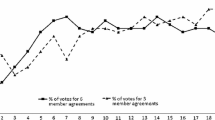Abstract
This paper focuses on the link between group co-operation and unilateral commitment of some countries in the presence of global environmental problems. We show that in case of a failure of negotiation, some countries can decide to commit unilaterally and reduce their emissions. We call this behaviour precautionary commitment. Absence of international agreement does not mean global defection from the environmental issue.We also show that the emergence of a non-co-ordinatedglobal co-operation can result from a strategic actionfrom the members of the coalition. The insiders of the coalition create an incentive for the non-members to reduce without co-ordinating their emissions.
Similar content being viewed by others
REFERENCES
Axelrod R. (1984), The Evolution of Co-operation. New York: Basic Books.
Barrett S. (1991), The Paradox of International Agreements, mimeo. London Business School.
Barrett S.(1992), ‘International Environmental Agreements as Games’, in R. Pethig, ed., Conflicts and Co-operation in Managing Environmental Resources. Springer-Verlag.
Barrett S. (1994), ‘Self Enforcing InternationalAgreements’, Oxford Economic Papers 46, 878–894.
Barrett S. (1997a), ‘HeterogeneousInternational Environmental Agreements’, in Carraro, ed., International Environmental Negotiations, Strategic Policy Issues. U.K.: Edward Elgar.
Barrett S. (1997b), ‘The Strategy of Trade Sanctions in InternationalEnvironmental Agreements’, Resource and Energy Economics 19, 345–361.
Carraro C. andD. Sinicalco (1992), ‘The International Dimension of Environmental Policy’, European Economic Review 36, 379–387.
Carraro C. and D. Sinicalco (1993), ‘Strategies for the International Protection of theEnvironment’, Journal of Public Economics 52, 309–326.
Chander P. and H. Tulkens (1992),‘Theoretical Foundations of Negotiations and Costs Sharing in Transfrontier Pollution Problems’, European Economic Review 36, 388–398.
Chen Z. (1997), ‘Negotiating an Agreement on Global Warming: ATheoretical Analysis’, Journal of Environmental Economics and Management 32, 170–188.
D'Aspremont C., A. Jacquemin, J. Gabszewics and J. Weymark (1983), ‘On the Stability of CollusivePrice Leadership’, Canadian Journal of Economics 16, 17–25.
Donsimoni M., N. Economidesand H. Polemarchakis (1986), ‘Stable Cartels’, International Economic Review 27, 317–327.
Folmer H., P. Mouche and S. Ragland (1993), ‘Interconnected Games and International EnvironmentalProblems’, Environmental and Resource Economics 3, 313–335.
Güth W., W. Leininger and G. Stephan (1991), ‘On Supergames and Folk Theorems — a Conceptual Discussion’, in R. Selten, ed., Game Equilibrium Models, Volume II: Methods, Morals and Markets. Berlin: Springer Verlag.
Hardin G.(1968), ‘The Tragedy of Commons’, Science 162, 1243–1248.
Hoel M. (1991), ‘GlobalEnvironmental Problems: The Effects of Unilateral Actions Taken by One Country’, Journal of Environmental Economics and Management 20, 55–70.
Kaitala V., M. Pohjola and O. Tahvonen (1992a),‘Transboundary Air Pollution and Soil Acidi-fication: A Dynamic Analysis of an Acid Rain Game Between Finland and the USSR’, Environmental and Resource Economics 2, 161–181.
Kaitala V., M. Pohjola and O. Tahvonen (1992b), ‘An Economic Analysis of Transboundary Air Pollution Between Finland and the Former Soviet Union’, Scandinavian Journal of Economics 94, 409–424.
Ostrom E. (1990), Governing theCommons. Cambridge: Cambridge University Press.
Péreau J-C. and T. Tazdaït (2000), Partial andGlobal Co-operation with Unilateral Commitment in the Presence of Global Environmental Problems. Nota di lavoro, September, FEEM.
Rotillon G. and T. Tazdaït (1996), ‘International Bargaining in the Presence ofGlobal Environmental Change’, Environmental and Resource Economics 8, 293–314.
Rotillon G.,T. Tazdaït and S. Zeghni (1996), ‘Bilateral or Multilateral Bargaining in the Face of Global Environmental Change’, Ecological Economics 18, 177–187.
Snidal D. (1985), ‘Co-ordination versus Prisoners'Dilemma: Implications For International Cooperation and Regimes’, American Political Science Review 79, 923–942.
Author information
Authors and Affiliations
Rights and permissions
About this article
Cite this article
Pereau, JC., Tazdait, T. Co-operation and Unilateral Commitment in the Presence of Global Environmental Problems. Environmental and Resource Economics 20, 225–239 (2001). https://doi.org/10.1023/A:1012638802001
Issue Date:
DOI: https://doi.org/10.1023/A:1012638802001




